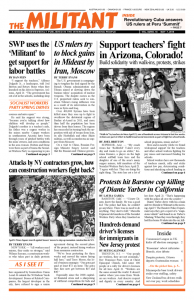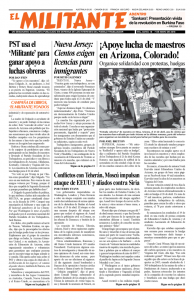Hundreds of thousands of people rallied in Barcelona April 15, demanding the release and return to Catalonia of jailed leaders of pro-independence parties and groups who fled the country to escape charges and imprisonment. This was the latest protest against the Spanish government’s relentless campaign against Catalonia’s self-rule and those who advocate independence.
Madrid took over the Catalan administration Oct. 30 after Prime Minister Mariano Rajoy suspended Catalonia’s autonomy and imposed direct federal rule. He called snap elections Dec. 21, hoping a slate of candidates pledged to unity with Madrid would win. But his Popular Party was the biggest loser, becoming the smallest of the parties in parliament. Supporters of independence won a plurality, but have been prevented from forming a government. Madrid has rejected everyone elected as president in Catalonia, since they were either in exile or prison.
Using the cops and courts, Rajoy’s party has led attacks, some violent and thuggish, against Catalan national rights for the past decade.
The Dec. 21 elections took place amid a sharply polarized political situation. Madrid imposed direct rule after the Catalan parliament declared independence after an Oct. 1 popular referendum that the government declared illegal. Madrid tried to stop the vote by brute force, sending in thousands of Civil Guards and National Police, but the attempt failed. Rajoy then overturned the independence vote, and sacked the Catalan president, the government and members of parliament.
The April 15 rally was organized by the National Catalan Assembly and Omnium Cultural, two major civic groups favoring independence, to mark six months behind bars for their presidents, Jordi Cuixart and Jordi Sànchez. The Catalan branches of Spain’s two leading trade unions supported the protest, along with a wide array of other groups. Not all of them are pro-independence, but they oppose the detentions.
Cuixart and Sànchez are two of nine imprisoned pro-independence leaders. Among the others are previous Vice President Oriol Junqueras and several former ministers and legislators. Spain’s Attorney General José Manuel Maza has filed charges of rebellion, sedition and embezzlement against a total of 25 Catalan leaders. If found guilty they could face 30 years in prison.
Seven of those charged left the country to avoid arrest. Among them is Carles Puigdemont, the previous president, who has been residing in Belgium. He was also elected to parliament and was its first choice for president. But Rajoy said he would be seized and arrested if he tried to re-enter the country.
Sànchez was one of the pro-independence leaders elected in December. After Madrid prevented Puigdemont from being seated, Sànchez was proposed to become the new president. But Madrid refused to let him out of prison. In his place the Catalan parliament nominated Jordi Turull, who Madrid then arrested March 23.
Acting on an extradition request from Madrid, Puigdemont was taken into custody when he traveled to Germany March 25. After a German court rejected his extradition on charges of rebellion, he was released April 5. But he is still ordered to remain in the country until the court decides whether to ship him to Spain on lesser embezzlement charges.
Polarized political situation
Over the course of the monthslong battle between Madrid and the elected governments in Catalonia, sizable demonstrations have taken place there both in favor of and against independence.
The polarization is part of the differentiated responses of social classes to the conditions generated by capitalism’s global crisis of trade, production and employment on working people. The steep 2007-2008 downturn increased economic and class divisions throughout the imperialist world, but more so in Spain, including in Catalonia, than in many other countries.
The Spanish Constitutional Court revoked major aspects of Catalan autonomy in 2010, including parts of a 2006 Autonomy Charter that recognized “Catalonia as a nation.” The charter was a conquest gained after the overthrow of the decadeslong dictatorial Spanish regime of Generalissimo Francisco Franco. The court also ruled unconstitutional the preferential use of the Catalan language.
The heart of support for Catalan independence is the urban professional and middle classes, students and rural toilers. Industrial workers in the province’s large auto plants, chemical factories and on the docks have not been central to the mobilizations, and backing for a complete break with Spain is smaller in working-class areas. In recent decades many workers moved to Catalonia from other parts of Spain and abroad, looking for jobs in the highly industrialized region.
Driven by the deepening capitalist crisis, Catalan pro-independence governments have all too often joined forces with the federal government in attacks on workers’ conditions. This has weakened support for independence.
If no government can be formed in Catalonia by May 22, the Rajoy administration says it will hold elections there again to get a government to its liking.

